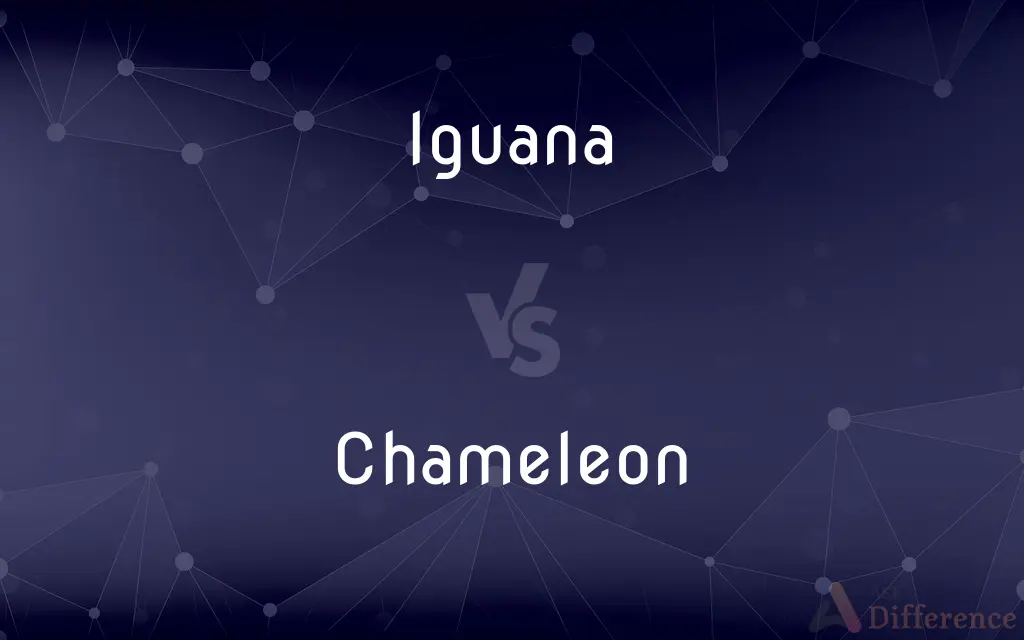Iguana vs. Chameleon — What's the Difference?

Difference Between Iguana and Chameleon
ADVERTISEMENT
Compare with Definitions
Iguana
Iguana (, Spanish: [iˈɣwana]) is a genus of herbivorous lizards that are native to tropical areas of Mexico, Central America, South America, and the Caribbean. The genus was first described in 1768 by Austrian naturalist Josephus Nicolaus Laurenti in his book Specimen Medicum, Exhibens Synopsin Reptilium Emendatam cum Experimentis circa Venena.
Chameleon
Chameleons or chamaeleons (family Chamaeleonidae) are a distinctive and highly specialized clade of Old World lizards with 202 species described as of June 2015. These species come in a range of colors, and many species have the ability to change color.
Iguana
Any of various usually large herbivorous lizards of the subfamily Iguaninae, often having a dorsal crest and found chiefly in tropical America.
Chameleon
Variant of Chamaeleon.
Iguana
A green iguana (Iguana iguana), a large tropical American lizard often kept as a pet.
ADVERTISEMENT
Chameleon
Any of various tropical lizards of the family Chamaeleonidae, chiefly of Africa and Madagascar, having a prehensile tail, eyes that can move independently, and the ability to change color.
Iguana
(zoology) Any member of the genus Iguana.
Chameleon
An anole lizard, especially Anolis carolinensis of the southeast United States.
Iguana
Colloquially, in America and the Pacific, any of several members of the lizard family Iguanidae.
Chameleon
A changeable or inconstant person
"In his testimony, the nominee came off as ... a chameleon of legal philosophy" (Joseph A. Califano, Jr.).
Iguana
Colloquially, in Africa, any large member of the genus Varanus, especially the aquatic Nile monitor (see leguan).
Chameleon
A small to mid-size reptile, of the family Chamaeleonidae, and one of the best known lizard families able to change color and project its long tongue.
Iguana
Any member of the genus Varanus (see goanna).
Chameleon
(figuratively) A person with inconstant behavior; one able to quickly adjust to new circumstances.
Iguana
Any species of the genus Iguana, a genus of large American lizards of the family Iguanidæ. They are arboreal in their habits, usually green in color, and feed chiefly upon fruits.
Chameleon
(physics) A hypothetical scalar particle with a non-linear self-interaction, giving it an effective mass that depends on its environment: the presence of other fields.
Iguana
Large herbivorous tropical American arboreal lizards with a spiny crest along the back; used as human food in Central America and South America
Chameleon
Describing something that changes color.
The wall was covered with a chameleon paint.
Chameleon
A lizardlike reptile of the genus Chamæleo, of several species, found in Africa, Asia, and Europe. The skin is covered with fine granulations; it has eyes which can move separately, the tail is prehensile, and the body is much compressed laterally, giving it a high back. It is remarkable for its ability to change the color of its skin to blend with its surroundings.
Chameleon
A person who changes opinions, ideas, or behavior to suit the prevailing social climate; an opportunist.
Chameleon
A changeable or inconstant person
Chameleon
A faint constellation in the polar region of the southern hemisphere near Apus and Mensa
Chameleon
Lizard of Africa and Madagascar able to change skin color and having a projectile tongue
Share Your Discovery

Previous Comparison
Hyperopia vs. Presbyopia
Next Comparison
OD vs. MD














































